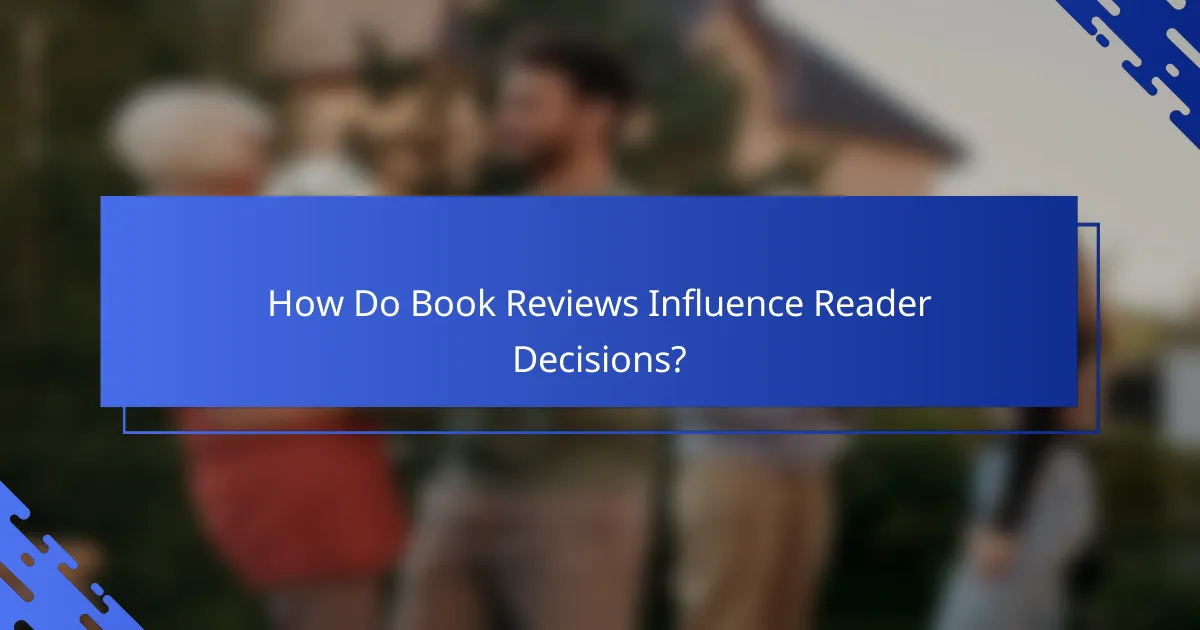Book reviews play a crucial role in influencing reader decisions, as they shape perceptions and guide purchasing choices. By enhancing the credibility of these reviews through trusted platforms and professional insights, authors and publishers can significantly impact a book’s success in the market.

How Do Book Reviews Influence Reader Decisions?
Book reviews significantly impact reader decisions by shaping perceptions and guiding purchasing choices. Positive reviews can enhance a book’s appeal, while negative feedback may deter potential buyers.
Impact on purchasing behavior
Book reviews play a crucial role in influencing purchasing behavior. Studies suggest that a majority of readers consult reviews before making a purchase, often leading to increased sales for highly-rated titles. For example, a book with numerous positive reviews may see sales increase by 20-30% compared to similar titles with few or negative reviews.
Readers often rely on reviews to gauge whether a book aligns with their interests or needs. A well-articulated review can highlight key themes or insights, helping potential buyers decide if the book is worth their time and money.
Role of credibility in reviews
The credibility of a book review significantly affects its influence on readers. Reviews from established sources, such as literary magazines or well-known bloggers, tend to carry more weight than those from anonymous users. Readers often look for indicators of credibility, such as the reviewer’s expertise or the presence of verified purchase tags.
To enhance credibility, authors and publishers should encourage honest feedback from readers and engage with reviewers. Authentic reviews that reflect genuine experiences are more likely to resonate with potential buyers.
Effect on author visibility
Book reviews can enhance an author’s visibility in a crowded market. Positive reviews can lead to increased media coverage, invitations to book events, and greater social media presence. This visibility can create a snowball effect, attracting more readers and boosting sales.
Authors should actively seek reviews from various platforms, including Goodreads and Amazon, to maximize their reach. Engaging with readers and reviewers can also foster a loyal fan base that further promotes the author’s work.
Influence of social proof
Social proof, such as the number of reviews and average ratings, significantly influences reader decisions. A book with a high rating and numerous reviews is often perceived as more trustworthy and appealing. This phenomenon is particularly evident in online retail environments where potential buyers can easily compare options.
Authors and publishers should focus on building a strong review base early in a book’s release to leverage social proof effectively. Encouraging readers to leave reviews can create a positive feedback loop that enhances the book’s reputation.
Comparison with other marketing strategies
Compared to traditional marketing strategies, book reviews offer a cost-effective way to reach potential readers. While advertising can be expensive and may not guarantee engagement, authentic reviews provide organic visibility and credibility.
Authors should consider integrating reviews into their overall marketing strategy. Utilizing social media to share positive reviews or collaborating with influencers can amplify the impact of reviews, creating a multifaceted approach to book promotion.

What Strategies Enhance Book Review Credibility?
Enhancing the credibility of book reviews involves employing strategies that establish trustworthiness and authority. Key methods include utilizing verified platforms, engaging professional reviewers, and incorporating reader feedback.
Utilizing verified platforms
Using verified platforms for book reviews can significantly boost credibility. Websites like Goodreads, Amazon, and specialized literary blogs often have established audiences and trust, making reviews posted there more impactful.
When selecting a platform, consider its reputation and user engagement. A review on a well-known site can reach a wider audience and lend more weight to the reviewer’s opinion.
Engaging professional reviewers
Professional reviewers, such as those from literary magazines or established bloggers, can enhance the credibility of book reviews. Their expertise and experience in analyzing literature often provide deeper insights that casual readers may not offer.
To find professional reviewers, look for those who have a history of reviewing similar genres or authors. This targeted approach ensures that the feedback is relevant and informed, adding value to the review process.
Incorporating reader feedback
Incorporating feedback from readers can enhance the credibility of book reviews by showcasing diverse perspectives. Encouraging readers to share their thoughts can create a more comprehensive view of the book’s strengths and weaknesses.
Consider using surveys or comment sections to gather reader opinions. Highlighting a range of feedback, including both positive and negative reviews, can provide a balanced view that resonates with potential readers.

Which Platforms Are Best for Book Reviews?
The best platforms for book reviews include Goodreads, Amazon, and niche sites like Book Riot, each serving different audiences and purposes. Choosing the right platform depends on your goals, whether it’s community engagement, sales impact, or targeting specific reader interests.
Goodreads as a community hub
Goodreads is a social platform designed specifically for book lovers, making it an ideal community hub for sharing reviews. Users can create profiles, follow friends, and join groups, fostering discussions around books and genres.
When posting reviews on Goodreads, consider engaging with other users by commenting on their reviews or participating in group discussions. This interaction can enhance your visibility and credibility within the community.
Amazon’s review system
Amazon’s review system is one of the most influential platforms for book reviews, directly impacting sales and visibility. Reviews on Amazon can help potential buyers make informed decisions, as they often look for ratings and feedback from other readers.
To maximize the impact of your Amazon review, be concise and specific about what you liked or disliked. Aim for a balanced perspective, as overly positive or negative reviews may raise skepticism among readers.
Book Riot for niche audiences
Book Riot caters to specific literary interests, making it a valuable resource for niche audiences. It features articles, podcasts, and reviews that focus on diverse genres and themes, appealing to readers looking for curated content.
If you want to reach a targeted audience, consider submitting your reviews or articles to Book Riot. Tailor your content to align with their themes, such as representation in literature or genre-specific recommendations, to increase your chances of publication.

What Are the Key Attributes of Effective Book Reviews?
Effective book reviews possess several key attributes that enhance their usefulness and credibility. These attributes include clarity and conciseness, balanced critique, and an engaging writing style.
Clarity and conciseness
Clarity and conciseness are essential for effective book reviews, as they allow readers to quickly grasp the reviewer’s insights. A clear review avoids jargon and complex sentences, focusing instead on straightforward language that conveys the main ideas succinctly.
To achieve clarity, reviewers should summarize the book’s main themes and arguments in a few sentences. Aim for a length that is manageable—typically between 300 to 500 words—ensuring that each sentence adds value to the overall assessment.
Balanced critique
A balanced critique evaluates both the strengths and weaknesses of a book, providing a fair perspective for potential readers. This approach helps readers understand what to expect and whether the book aligns with their interests.
When writing a balanced critique, consider using a simple structure: start with the positives, then address any shortcomings. For example, if a book has compelling characters but a slow plot, mention both aspects to give a well-rounded view.
Engaging writing style
An engaging writing style captivates readers and encourages them to continue reading the review. This can be achieved through a conversational tone, vivid descriptions, and personal anecdotes that relate to the book’s themes.
To enhance engagement, use rhetorical questions or relatable scenarios that resonate with the audience. Additionally, incorporating quotes from the book can provide insight while adding a dynamic element to the review.

How Do Book Reviews Impact Author Success?
Book reviews significantly influence an author’s success by affecting visibility and credibility. Positive reviews can lead to increased sales and a stronger reputation, while negative feedback can hinder an author’s career.
Boosting sales and rankings
Book reviews play a crucial role in boosting sales and improving rankings on platforms like Amazon and Goodreads. A higher number of positive reviews can elevate a book’s visibility, often leading to more purchases.
For instance, books with a rating of 4 stars or higher typically see a substantial increase in sales compared to those with lower ratings. Authors should aim to gather reviews from early readers and influencers to create momentum upon release.
Enhancing reputation
Reviews contribute to an author’s reputation within the literary community and among potential readers. A collection of favorable reviews can establish an author as a credible voice in their genre, attracting more readers and opportunities.
Authors should actively engage with reviewers and readers on social media and book platforms, as this interaction can further enhance their reputation. However, it’s essential to handle negative reviews gracefully, as how an author responds can impact their public image.
